- Home
- P. G. Wodehouse
SIX SHORT STORIES
SIX SHORT STORIES Read online
SIX SHORT STORIES
P. G. Wodehouse
SIX SHORT STORIES
P. G. WODEHOUSE
This page copyright © 2002 Blackmask Online.
http://www.blackmask.com
CUPID AND THE PAINT-BRUSH
THE IDLE KING
THE DASTARDLY BEHAVIOUR OF BASHMEAD
ALL ABOUT THE PASTIME OF DIVORCE
AUBREY'S ARRESTED INDIVIDUALITY
THE DISAPPEARANCE OF PODMARSH
Etext by Dagny and the Blandings Group
CUPID AND THE PAINT-BRUSH
Marjorie was sitting under the cedar on the tennis-lawn. It seemed to me that the best way of spending my morning would be to go and sit under the cedar on the tennis-lawn too.
"Good morning," I said as I came up. I had seen her before, but "Good morning" is such an excellent conversational gambit.
"Good morning," said Marjorie. She marked with a finger her place in the book she was reading, and tried to impress me with the idea that she was busy, but could give me two minutes if I had something of exceptional importance to say.
I declined to encourage this absurd attitude. I took away her book kindly but firmly, laid it down on the grass out of her reach, and began.
"Marjorie," I said.
From constantly playing Juliet to my Romeo, Marjorie has developed a habit of reading my thoughts, which at times I find distinctly inconvenient.
"I should make you wretched," she said.
"Not at all," said I politely. "Besides, what are you doing now but making me wretched?"
"You don't know what I'm like, really, or you wouldn't —"
"Persevere? Of course I should. I know much better than you what's good for you. Think how much older I am. We were made for one another."
Marjorie appeared to ponder.
"Say the word," I added encouragingly. Marjorie and I have known each other since I was in sailor suits.
"You'd hate the sight of me in a couple of years," said she.
"By that time you would adore me so passionately that you wouldn't notice it. I am an acquired taste; but once acquired, never lost."
"You know it wouldn't do, really."
"May I ask why on earth not? I wish we could manage this affair without argument. I hate arguing."
"So do I."
"Then why argue? Agree with me — and all shall be forgiven."
"Will it make you conceited if I tell you something?"
"Impossible."
"Well, it isn't you I object to. It's the being married at all — just yet." The last two words were added as a species of afterthought.
"Now, that is a concession. My suit, then, I take it, is practically smiled upon?"
"I knew it would make you conceited."
"Not at all. Merely natural gratification. What is your objection to marriage in the abstract? Tell me the worst. Are you a woman with a mission?"
"Well, I suppose I am, in a way. I want to paint."
"But —"
"I knew you would say that. Don't be silly. I mean paint pictures, of course. You shouldn't twist people's meanings. It's a very bad habit. Will you please pass me my book?"
I deliberately moved the inconvenient volume still further out of the way with my foot. Such a request at such a moment was simply impertinent, and I ignored it.
"Will you give me my book, please?"
"No. Couldn't you go on painting when you were Mrs. Me?
"Of course not. I should get lazy."
"We could work together. I also am an artist of peculiar merit."
"You?"
"Decidedly. You didn't see the comments of the Press on my last year's Academy picture, then?"
"No. Did you?"
"No. That, however, was simply because there was no such picture. Painting, however, is a game which two can play at. Do you know what my initials are? R. A."
"Well?"
"Well, if that is not an omen, what is an omen? Tell me that. Now, look here, Marjorie, we are going to make a sporting bargain. We will each paint a picture for the Academy this year, and whoever paints the better one has his or her (it is not likely to be her) way in the matter. Do you agree?"
"Who is to judge?"
"We will buttonhole the President and get his private opinion. Only you must not sign your name, of course. These Academicians, you know, they'd give the verdict to a lady without a second look. Now do you agree?"
"Very well. It's very silly."
"Silly! Good gracious! It's a life and death matter to me. That is all I want to say. You may now go on reading that very worthless book. I've lost your place."
"Marjorie left next day. A fortnight later I met her in town. I was coming down the steps of my club, and our ways, by some extraordinary coincidence, happened to lie in the same direction.
"How does the picture progress?" I asked. "Personally I have chosen an allegorical subject. I call it 'Waiting.'"
"That is original."
"Isn't it? Originality is quite a hobby of mine. I intend to represent a beautiful young lady dressed in a neat creation of white, standing on a rustic bridge with her back to a rather sweet thing in Turneresque sunsets."
"I see. And how does the title apply?"
"She is supposed to be waiting for a gentleman to whom she is devotedly attached. He is at present not in sight. But in one corner of the canvas an angel form, in whom the acute observer will readily recognise Fame, heralds his approach with a few notes from a gold trumpet. An expression of intense but natural gratification shines on the face of the beautiful young lady."
"I suppose so."
"And how is yours getting on, and what is it to be?"
"I am painting a landscape."
"With figures?"
"There's a cow in one corner."
"Nothing else?"
"No."
"Then I feel secure. The President, wavering between the merits of our respective landscapes, will remember my beautiful young lady, and the thing will be done. I see him at this moment, his face one large expanse of admiration."
"Indeed?"
"Yes. Now perhaps, under the circumstances, you would like to retire from the contest and acknowledge my superiority?"
"I shall do nothing of the sort. I don't believe you are painting a picture at all. I don't believe you can paint."
"Good morning, Miss Somerville," I said. "After that, you will hardly expect me to speak to you. Here we are at your door, and I will take my wounded self off in a hansom."
Sending-in day came and went, and one morning I called at the Somervilles' and asked to see Marjorie. The butler thought she was in the drawing-room. The rest of the family were out, but she had stopped at home. Should he tell her that I had called? I said that there was no necessity to announce me. I would go to the drawing-room.
I knocked steadily at the door for three-quarters of an hour (it may have been less) and then went in. At first the room seemed empty. Then I noticed a limp form on the sofa. It was Marjorie, and she was crying. I can stand a good many things, but one of the things which I cannot stand is to see Marjorie cry. She started up as I came in, and endeavoured to mend matters with a wholly inadequate pocket-handkerchief.
"I did knock," I said. "Marjorie, do tell me what's the matter. Has the picture been rejected?"
"Yes." A sob from the sofa.
"Never mind. We're both in the same —"
"I see now how silly I was ever to think I could paint."
I caught my own eye in the mirror and winked affectionately at it.
"Marjorie," I said, placing a hand in hers — always a sound move — "we will forget that idiotic wager. Treat me as if I had never asked you before, and tell me that you'll — will you?" At this poin
t it seemed judicious to remove my hand from hers and slide it round her waist. I did so. She made no protest.
"Marjorie, say 'Yes.'"
"Yes." In a whisper from the sofa.
"After that, several other things seemed judicious, and I did them all. She appeared rather to like it than otherwise.
"Marjorie," I said, after a long silence, "do you know why I came today? I wanted to ask you to take me in spite of that absurd wager."
"But you won it."
"No. It was a drawn game. My allegory failed to impress the Committee."
"What! You were refused?"
"My picture was. I was accepted. By you. Don't move."
She did not move.
Another long silence.
"We'll take to photography," I said at last thoughtfully. "Share the same camera and develop off the same plate."
Marjorie sat up suddenly.
"Do you know," she said, "I don't mind so very, very much about the picture. I never did think very highly of the Academy. You know, it's so — so —"
"Yes, isn't it?" I said. Exactly what I have always thought about it. Don't move."
She did not move.
THE IDLE KING
There was once a King of Aldebaran, and he was probably the very idlest man in the world. He would sit on his throne and do nothing from morning till night. And then he would go to bed, and the next day it would be just the same. He did nothing but sit still. And he was not even nice to look at. It was not quite his fault that he was so lazy. His people would never let him do anything for himself. Sometimes he would say, "It is a fine day. I will make a law." And then the Vizier would come bustling up, murmuring, "Excuse me, your Majesty, one moment." And he would call Parliament together and take the law out of the King's hands and make it for him. And sometimes the King would say, "It is a fine day. I will go a-hunting." And then the Lord Chief Huntsman would jump on his horse, shouting, "Don't you trouble yourself, your Majesty. Allow me." And then he would blow his horn, and ride off, and not come back for the whole day. And the King began to grow very tired of doing nothing. He could not enjoy his meals or the sunshine, or his dogs, or cats, or anything. So one day when the Vizier was busy making a law which he had specially wanted to make himself, and the Lord Chief Huntsman had gone off with his hawk and his hound to save his Majesty the trouble of hunting, he took off his crown and his beautiful clothes, dressed himself up in a very old suit and a very old cap, and started out by the back door of the Palace to see the world.
It was nearly his tea-time when he had started, and he soon began to grow hungry. It was about this time that the Lord Chief Butler always brought him a pot of tea (which, of course, he was never allowed to pour out for himself, though he wanted to dreadfully), and a plate of hot buttered toast, and little cakes with chocolate on them. So he went to the nearest cottage, and knocked at the door. It was quite a treat for him to knock at a door all by himself. Generally the Lord Chief Footman did it for him.
"Come in," said a voice. "And mind the step."
The King went in. Round the table were seated the cottager, his wife, and his children.
"Please, I want some tea," said the King.
"You will have to work for it," said the cottager.
"What is work, please? Is it what everybody else does for me?"
"It's not what everybody else does for me, at any rate," said the cottager, with a jolly laugh, "and thank goodness they don't. What I should do if everybody did my work for me, I do not know. I should be so dull that I should have no appetite for tea. Whereas now," he added, taking a huge bite out of a piece of bread-and-jam, "my appetite is exceedingly good, thanks very much, and so forth."
And swallowing his bread-and-jam, he sang the following verse, to which the whole family beat time with their teaspoons.
Oh, I think a man's crazy who's idle and lazy, I pity the people who shirk. It's a pound to a shilling, you'll smile if you're willing To work! work! work! If you don't see the beauty of doing your duty, Your happiness stops with a jerk. So I counsel you, dunce, to start learning at once, And work! work! work!
It was rather a pretty song.
"That sounds very sensible indeed," said the King, when he had finished. "I should like to begin now, if I may. What shall I do?"
"In yonder yard," replied the cottager, "is some wood. Chop it. Will somebody kindly be good enough to oblige me by passing the jam?"
So the King went out into the yard, and though he did not know very much about chopping wood (for the Lord Chief Woodman always did that for him), he somehow managed to finish it in time. And then be went back, and settled down to a really good tea.
"Well," he said thoughtfully, as be finished the jam, "there is no denying it. This work is a wonderful thing. I have never enjoyed my tea so much in all my life. Thank you very much."
"Not at all," said the polite cottager. I beg you will not mention it." He opened the door, and the King went out again upon his travels.
He wandered some miles, until night began to come on, and he began to think about finding somewhere to sleep. At last he came to a castle, and rang the visitors' bell.
"Could you please tell me," he said, as the servant opened the door, "if I might sleep here for the night? I have come a long way, and I am tired."
The servant said he would make inquiries within. He went through a door at the side of the hall, and soon came back with his master's compliments, and he could certainly sleep there if he was willing to do some work in return.
"It certainly is a most wonderful thing, this work," thought the King. "When I remember how little of it there was in my palace, and see what a great deal there is everywhere else, it surprises me. I will certainly do the work he wants me to," he added aloud.
"That's right," said the footman. "Come to think of it, there's nothing like work."
And fixing his eyes dreamily on the ceiling, he sang the following verse:
"Oh, work it is a gentle thing, Beloved from pole to pole. It suits the fancy of a king —
"Ah," interrupted his Majesty, "you're right there."
"And," went on the footman,
"It satisfies his soul. "In idleness, though sweet at first, Dull care is apt to lurk. But happier he, it seems to me, Who spends his time in work."
It was rather a nice song.
"Excellent!" said the King. "Now show me the work, and I will do it."
The footman led the way to a cellar, and there were two heaps of great stones, and beside them lay a hammer.
"There," he said. "If you could kindly make it convenient to break those stones up small, we should esteem it a personal favour, and in the meantime I will be getting your room ready. I'll make you a nice cup of bread-and-milk to eat in bed. That's the hammer by the stones. You grasp it firmly in the two hands by the handle — that's this end here — and hit a stone with it. And by a curious process which it would take too long to explain, the stone will break into smaller stones. You then hit each of the smaller stones in the same manner, and in time you will find that the heap has become a lot of very small stones indeed. Then you come upstairs. Good-bye."
The King knew nothing whatever about breaking stones, for the Lord Chief Roadmender always did the work of that kind in the palace, but he set to, and in quite a short time all the stones were broken up so small that he could hardly see them. Then he put his hammer down, and went upstairs. And there, as the footman had promised, was the bread-and-milk steaming at the side of the bed on a chair. He enjoyed it more than he would have believed it possible that any one could enjoy bread-and-milk.
"Really," he said to himself, "it's a wonderful thing. Here am I, the King of Aldebaran, who usually find myself unable to eat anything more than a little wing of chicken, enjoying my bread-and-milk like a baby. It is really a fine invention, is work! When I get back to my palace, I must practise it more. Now I'll go to sleep." He went to sleep at once. He had never slept so well in his life before.
And when he got
up in the morning. he felt so well that he danced twice round his room before coming down to breakfast.
To earn his breakfast he had to pump water from a well. It was quite a new experience. At the palace the Lord Chief Ostler had always done it for him. He quite enjoyed it, and when he had finished he enjoyed his breakfast still more.
After breakfast he thanked his host kindly, and went away.
After stopping to wish the cottager, whom he found working in his garden, good morning, he made his way back to the palace.
The Vizier and the other courtiers welcomed him joyfully. They thought he had been lost.
"Well" said the Vizier, when he had heard the story of the King's adventures, "if your Majesty had thought of mentioning that your Majesty intended to take a walk, the Lord Chief Tramp might have taken it instead, and saved your Majesty the trouble."
"Then I'm very glad I didn't mention the fact," said the King. "In future I intend to do everything I possibly can for myself. You do your work, and I'll do mine."
"Your Majesty is surely joking," said the startled Vizier. "No King of Aldebaran has ever worked."
"This King of Aldebaran is going to. And he is going to begin at once. Bring me the Law Book."
"Cannot I —" began the Vizier.
"Bring me the Law Book," repeated the King. "In future I mean to make all the laws myself, And this is the first of them."
And in a beautifully clear voice he sang the following verse:
"You may do whatever sort of work you please. You may do whatever task you're most inclined to. You may do it on the earth or on the seas. You may do it in the air, if you've a mind to. You may choose to work at sums or plough your lands. You may choose an ordinary or a rum thing. You may do it with your head or with your hands. But every one in future must do something!"
And they did. And they all in consequence lived very happily ever afterwards.
THE DASTARDLY BEHAVIOUR OF BASHMEAD
The cynical and unblushing baseness of Rupert Alexander Bashmead had formed a subject of conversation among his friends and acquaintances from his eighth birthday onwards. At school his masters, drawing gloomy conclusions from the ingenious system of cribs for which the name of Bashmead is still a household word at St Asterisk's, were wont to observe that he would come to a bad end. They gave him to understand that if — by some miscarriage of justice — his sentence were to be commuted to penal servitude for life, they would be wounded and disappointed. At College it was an accepted axiom in his set that if there was only one comfortable chair in a room, Bashmead got it. In fact, he was Bashmead. There is no other word.

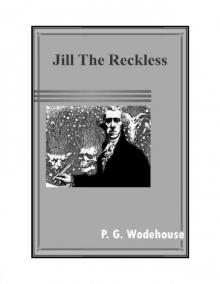 Jill the Reckless
Jill the Reckless Uncle Fred in the Springtime
Uncle Fred in the Springtime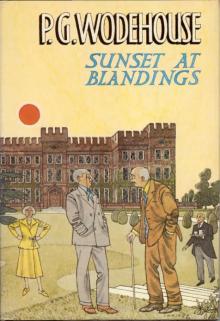 Sunset at Blandings
Sunset at Blandings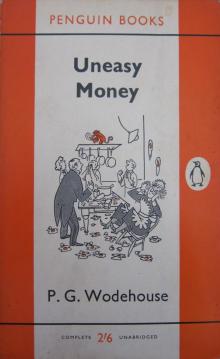 Uneasy Money
Uneasy Money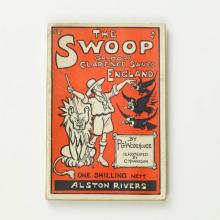 The Swoop! or, How Clarence Saved England: A Tale of the Great Invasion
The Swoop! or, How Clarence Saved England: A Tale of the Great Invasion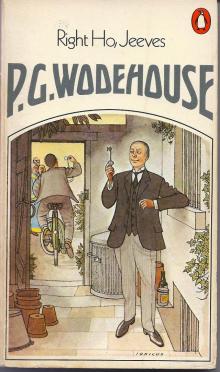 Right Ho, Jeeves
Right Ho, Jeeves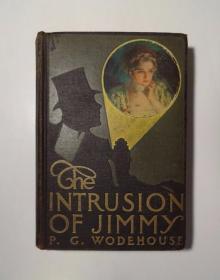 The Intrusion of Jimmy
The Intrusion of Jimmy The Jeeves Omnibus - Vol 1:
The Jeeves Omnibus - Vol 1: Aunts Aren't Gentlemen:
Aunts Aren't Gentlemen: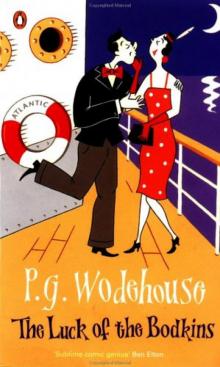 The Luck of the Bodkins
The Luck of the Bodkins The Little Nugget
The Little Nugget Money for Nothing
Money for Nothing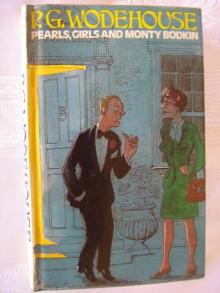 Pearls, Girls and Monty Bodkin
Pearls, Girls and Monty Bodkin Mulliner Nights
Mulliner Nights Blandings Castle and Elsewhere
Blandings Castle and Elsewhere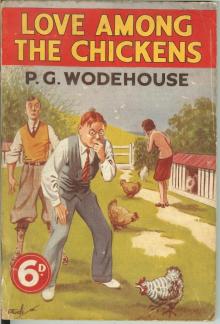 Love Among the Chickens
Love Among the Chickens Carry On, Jeeves!
Carry On, Jeeves! The Little Warrior
The Little Warrior Ice in the Bedroom
Ice in the Bedroom Leave It to Psmith
Leave It to Psmith Thank You, Jeeves:
Thank You, Jeeves: Money in the Bank
Money in the Bank The Man Upstairs and Other Stories
The Man Upstairs and Other Stories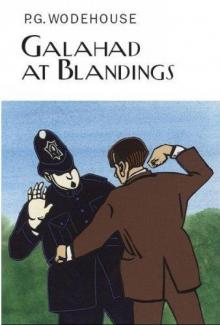 Galahad at Blandings
Galahad at Blandings The Jeeves Omnibus Vol. 5
The Jeeves Omnibus Vol. 5 Uncle Dynamite
Uncle Dynamite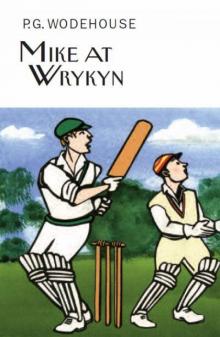 Mike at Wrykyn
Mike at Wrykyn Something Fresh
Something Fresh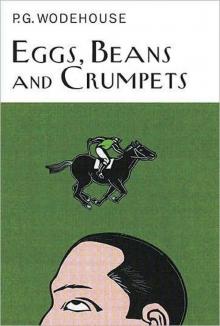 Eggs, Beans and Crumpets
Eggs, Beans and Crumpets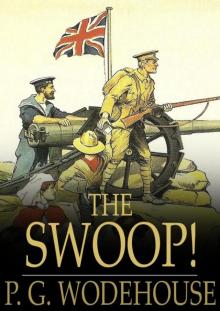 The Swoop: How Clarence Saved England (Forgotten Books)
The Swoop: How Clarence Saved England (Forgotten Books)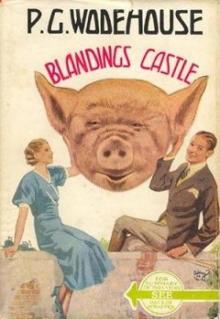 Blanding Castle Omnibus
Blanding Castle Omnibus Wodehouse at the Wicket: A Cricketing Anthology
Wodehouse at the Wicket: A Cricketing Anthology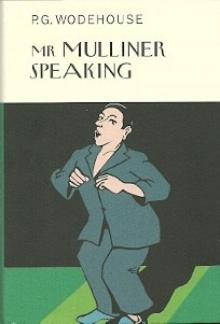 Mr. Mulliner Speaking
Mr. Mulliner Speaking Hot Water
Hot Water The Jeeves Omnibus - Vol 3: The Mating Season / Ring for Jeeves / Very Good, Jeeves
The Jeeves Omnibus - Vol 3: The Mating Season / Ring for Jeeves / Very Good, Jeeves The Mating Season
The Mating Season Meet Mr. Mulliner
Meet Mr. Mulliner The Man with Two Left Feet, and Other Stories
The Man with Two Left Feet, and Other Stories Not George Washington — an Autobiographical Novel
Not George Washington — an Autobiographical Novel Young Men in Spats
Young Men in Spats The Jeeves Omnibus Vol. 4
The Jeeves Omnibus Vol. 4 A Pelican at Blandings:
A Pelican at Blandings: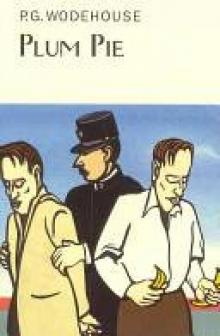 Plum Pie
Plum Pie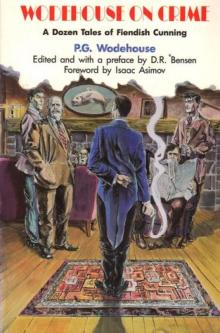 Wodehouse On Crime
Wodehouse On Crime The Jeeves Omnibus Vol. 2: Right Ho, Jeeves / Joy in the Morning / Carry On, Jeeves
The Jeeves Omnibus Vol. 2: Right Ho, Jeeves / Joy in the Morning / Carry On, Jeeves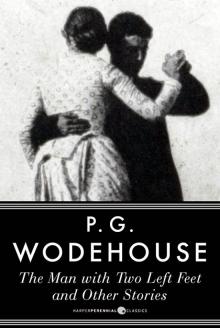 The Man With Two Left Feet
The Man With Two Left Feet Full Moon:
Full Moon: Jeeves and the Feudal Spirit:
Jeeves and the Feudal Spirit: Ring For Jeeves
Ring For Jeeves Something New
Something New The Girl on the Boat
The Girl on the Boat The Girl in Blue
The Girl in Blue Pigs Have Wings:
Pigs Have Wings: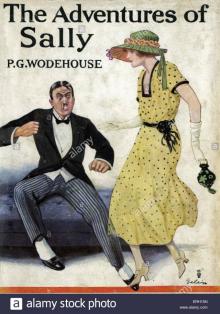 The Adventures of Sally
The Adventures of Sally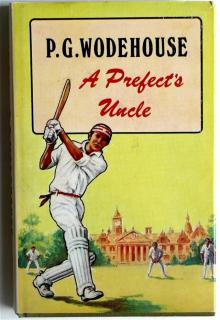 A Prefect's Uncle
A Prefect's Uncle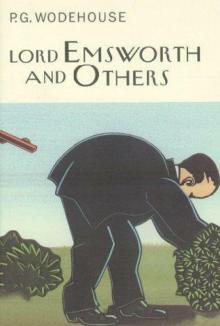 Lord Emsworth and Others
Lord Emsworth and Others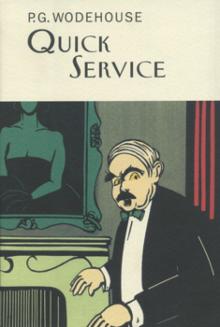 Quick Service
Quick Service The Prince and Betty
The Prince and Betty The Gem Collector
The Gem Collector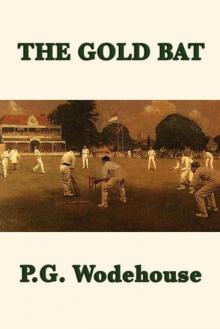 The Gold Bat
The Gold Bat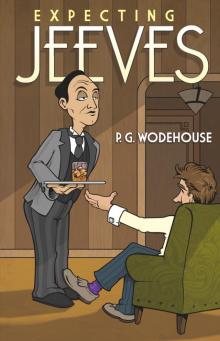 Expecting Jeeves
Expecting Jeeves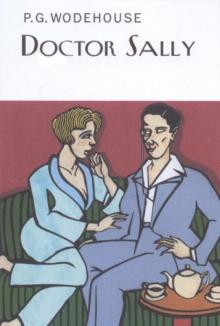 Doctor Sally
Doctor Sally Psmith, Journalist
Psmith, Journalist The Golf Omnibus
The Golf Omnibus Heavy Weather
Heavy Weather A Damsel in Distress
A Damsel in Distress The Coming of Bill
The Coming of Bill Summer Lightning
Summer Lightning Piccadilly Jim
Piccadilly Jim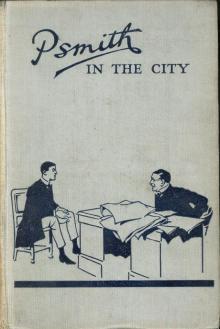 Psmith in the City
Psmith in the City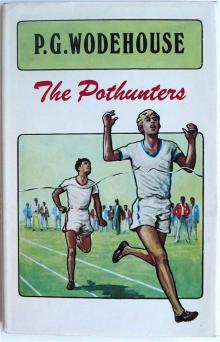 The Pothunters
The Pothunters Service With a Smile
Service With a Smile Big Money
Big Money Three Men and a Maid
Three Men and a Maid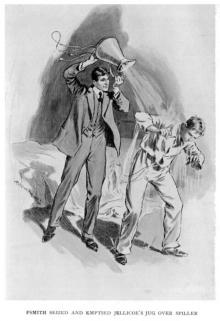 Mike and Psmith
Mike and Psmith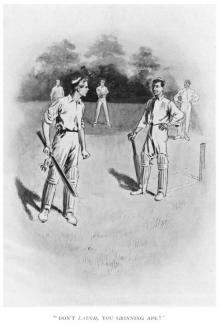 Mike
Mike Tales of St. Austin's
Tales of St. Austin's Indiscretions of Archie
Indiscretions of Archie Pigs Have Wings
Pigs Have Wings The Jeeves Omnibus - Vol 4: (Jeeves & Wooster): No.4
The Jeeves Omnibus - Vol 4: (Jeeves & Wooster): No.4 The White Feather
The White Feather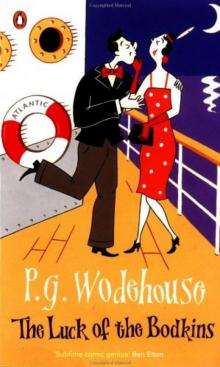 Luck of the Bodkins
Luck of the Bodkins THE SPRING SUIT
THE SPRING SUIT Full Moon
Full Moon Very Good, Jeeves
Very Good, Jeeves Thank You, Jeeves
Thank You, Jeeves Reginald's Record Knock.
Reginald's Record Knock. Wodehouse At the Wicket
Wodehouse At the Wicket LADIES AND GENTLEMEN V. PLAYERS
LADIES AND GENTLEMEN V. PLAYERS The Jeeves Omnibus - Vol 5: (Jeeves & Wooster)
The Jeeves Omnibus - Vol 5: (Jeeves & Wooster) The Jeeves Omnibus - Vol 1: (Jeeves & Wooster): No.1
The Jeeves Omnibus - Vol 1: (Jeeves & Wooster): No.1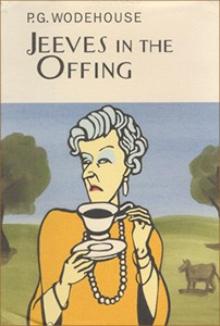 Jeeves in the offing jaw-12
Jeeves in the offing jaw-12